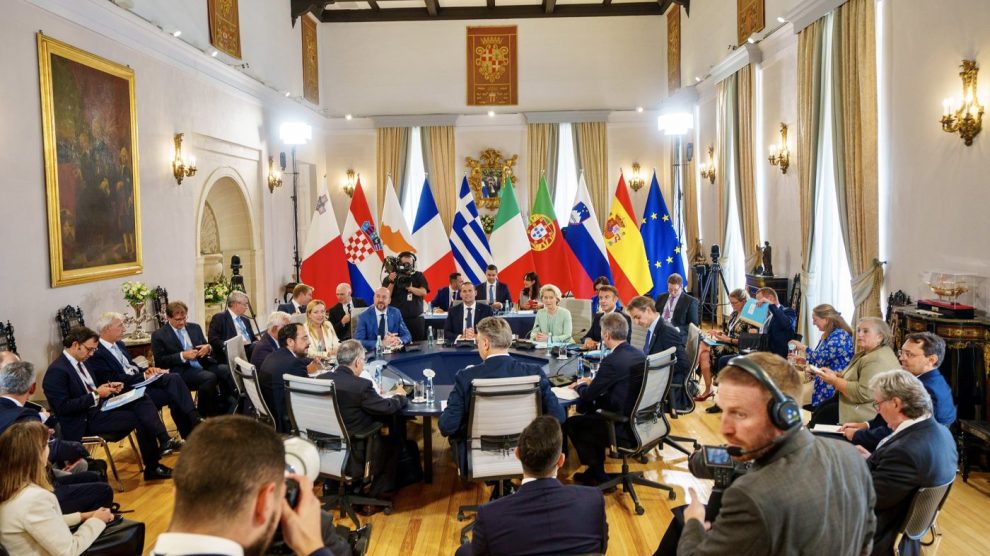The MED9 meet up. The leaders of Europe’s Mediterranean countries met in Malta on Friday to discuss shared challenges and opportunities. The migration dossier topped the agenda, as MED9 States – Croatia, Cyprus, France, Greece, Italy, Malta, Portugal, Slovenia and Spain – are at the forefront of the increasing migratory fluxes.
- “The Mediterranean holds vast opportunities, especially for the green transition. It is also home to shared challenges. So we need to join forces with our Southern neighbours. Deeper cooperation across both shores of the sea will benefit us all,” wrote EU Commission President von der Leyen on X.
- We do not agree on everything, but there’s much more that we agree on that makes the difference,” said Maltese PM’s Robert Abela, reiterating the importance of a “holistic EU approach” and calling on European capitals to finalise the migratory framework reform before the end of the European legislature.
The geometry of alliances. President von der Leten also took part in a 30-minute trilateral meeting with French President Emmanuel Macron and Italian Prime Minister Giorgia Meloni – who have recently agreed to cooperate more closely on migration. Germany, on the other hand, has removed its veto on the agreed-upon EU migratory framework but is tussling with Italy over NGO ships.
- Berlin’s requested amendment to the text, designed to protect the operation of NGO ships, is “a step backwards,” argued PM Meloni. She highlighted the unfair burden of NGOs dropping off migrants into the nearest port (that’s usually Italy) and argued that the NGOs’ country of provenance should be made responsible for that.
- Having the EU’s biggest countries allied on migration is the best chance of turning the framework into law. The next occasion for them to move forward might emerge at the informal EU Council meeting in Granada, Spain, on October 5-6.
Converging on Rome’s line. Still, the Italian PM noted there’s a general “will to tackle the issue with thoroughness and speed” among MED9 countries. “I was very clear in setting out the issue as I see it, [including] the impact it is having on Italy. There is a convergence among these countries,” which are not all in the EU Council but are all experiencing the spike in arrivals, she said, adding their position “is shared.”
- On its part, Italy “insists” on the implementation of a naval mission in the Mediterranean Sea to be carried out in agreement with North African authorities, said PM Meloni. She made a reference to the third stage of the now-cancelled Sophia mission – as the first stage acted as “a pull factor” – and noted that the current EU mission Irini “may be a tool to talk about.”
- Acting “differently” is necessary to act “effectively,” she quipped, noting that talking with Northern African countries is the way to go.
Cooperating with Northern African countries. Tunis is “giving comforting signals,” maintained PM Meloni, arguing it’s time to implement the EU-Tunisian partnership – and added that the first European funds will reach Tunisia soon. She also noted that the International Monetary Fund aid was still at a standstill – but enquired whether those resources could be “disconnected” from the EU’s aid.
- Still, echoing words from President von der Leyen, she noted the EU-Tunisia agreement “is a model that should be used with the countries of North Africa more generally.”
- That’s the core concept of Italy’s upcoming Mattei Plan for Africa.
- On the same day, Justice Minister Carlo Nordio signed two treaties with his counterparts from Algeria and Libya regarding strategies to combat migrant trafficking.





